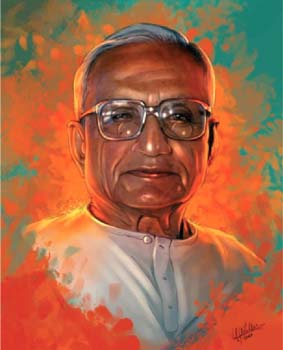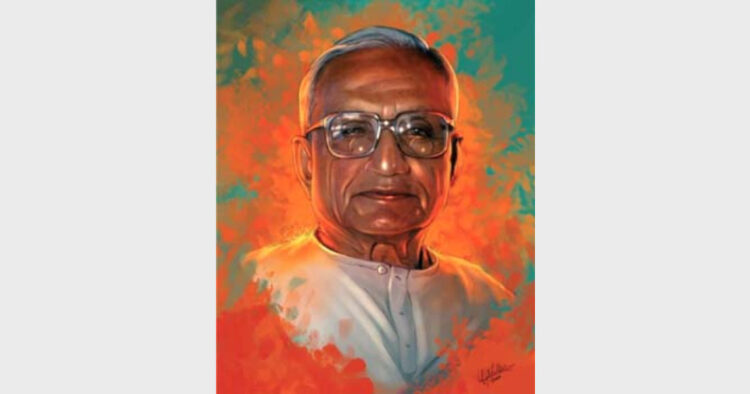Dattopant ji has written extensively on many aspects of the nation’s rebuilding. The article discusses some of his important principles of nation rebuilding
–Ravindra Mahajan

Dattopant Thengadi is a well-known 20th-century thinker in the country who came from the RSS stead. He assimilated the idea that the original Hindu thinking was profound in itself and that the nation needed to be rebuilt not only by maintaining its original formulas but also by giving them a form according to times and acquiring as much new knowledge as necessary in the world, not just from the West, in the die of our spirit.
Nation & National Goal
The idea of the nation that the scholars have accepted has been advocated by Shri Guruji (Golwalkar) and Dattopant ji. It goes like this – “A nation is a homogenous group of people living on a particular territory, living as children of that land and with the same traditions and aspirations, the same memories of past joys and sorrows, the same feelings of enmity and the common interests of all.” (Collection ‘Rashtra’, p. 213 Publisher Bharatiya Vichar Sadhana)
Dattopant ji says, “Our destination is the ultimate glory of the Hindu Nation. While moving towards this goal, we believe in one people, one culture, one nation, one country (undivided Bharat), one system ( Dharmarajya – a state based on conceptual creation rules, not a theocratic state). ”
Western Failure
There is a pervasive feeling in one section of the Indian society that everything from the West is superior. Against that backdrop, Dattopant ji drew attention to their failure. He said that our society should remember that the goal which failed in the West cannot be useful in the East as well.
Has the West been able to make proper adjustments to individual freedom and social discipline? The individual freedom is degraded into anarchy and social discipline turns into Barrackisation in the materialistic West. The West could not see the basic organic integration of the apparent diversity because it mistakenly equated the integration with uniformity. The West cannot feel the quality of the social structure of Hindus because it interpreted our stability as dullness and deemed its own adventurism as progressivism. The idea of a government without authoritarianism is beyond its comprehension. Similarly, it strongly believes that national self-reliance cannot go hand in hand with internationalism. That is why nationalism underwent a perverse transformation into exploitative imperialism and internationalism was looked upon as the treachery with own society in the West. In fact, everything in the West is still into experimentation. It has not been weighed against the test of time.
Our Option – Integrated Human Philosophy
Western nationalism was a reaction against the imperialism of the Pope in Rome. Capitalism, various forms of socialism or communism from there are not suitable for us because they cannot solve the problems of society. Quoting Rabindranath Tagore, Dattopant ji used to say that the question paper of each country was different and the answers of one were not applicable to others and such blind imitation will not fulfil our aspirations but will only increase the problems.
Ekatma Manav Darshan (Integrated Human Philosophy) based on the fundamental principles of Sanatan Dharma and its form according to times, should only be the basic philosophy of our national life and our policies in every field must be in that light. The sense, loyalty and realisation of one soul element in all cultivates the qualities of unity, harmony and mutual cooperation etc. in social life and makes life conducive and inspiring for the proper development of all the elements.
He would say that the future model of development that we intend must be based on the past, with the sense of present needs and having an eye on the aspirations of the future because conceiving the ever-changing social and economic systems in the light of constant, unchanging and universal formulas is at the core of the process intended by the Hindu way of life. The grafting of any alternative of such development which is not in harmony with the cultural essence of the society does not benefit the society.
Values and motivation are important when implementing the development process. About this, he says, “The Indian culture developed a coherent system of material and non-material values that would drive personal development. It is well known that material values of Artha and Kaam have been subtly aligned with the non-material values/aims of Dharma and Moksha. Neither there was heavy insistence on materialism nor were they neglected.
Quoting Rabindranath Tagore, Dattopant ji used to say that the question paper of each country was different and the answers of one were not applicable to others and such blind imitation will not fulfil our aspirations but will only increase the problem
As a result, motivations were also of two types – material and non-material! Social recognition and status based on physical benefits and non-material values! Each one could pursue any of these two motivations. The only condition was that the standard of enjoyment and social prestige would remain inversely proportioned. The greater the social prestige, the smaller the scope of consumption and if the scope of consumption was large, then the social prestige would be lower.”
Autonomous Social System
He intended an autonomous social structure where different sectors would balance each other in national life. The position of government will be one of them but an important one. Of course, dharma did not mean religion but the universal principles and ethics necessary for socialisation e.g. Yama, Niyam in the Patanjali Yoga Sutra or 11 Vratas advocated by Mahatma Gandhi. The formulas of conduct would change as per the time, place and situation. The laws and regulations of the government and administration should be in line with such principles and code of conduct.
Economics
Integral and holistic thinking was emphasised on in all of Dattopant ji’s propounding. He was a champion of balance and harmony. Although he was the leader of the largest farmers’ union (Bharatiya Kisan Sangh) and the trade union (Bharatiya Mazdoor Sangh) in the country, he never shared even a single partisan thought. He set an ideal before the other labour unions by saying that BMS should see the interests of the industry in the interests of the nation and interests of the labourers in the interests of the industry. He also insisted that Bharatiya Kisan Sangh should function by considering the village as a family. He suggested that there should be a national integrated economic policy for production, distribution and wages.
This is why he advocated Swadeshi and emphasised on things like self-reliance, decentralisation, sustainable utilisation, moderate consumption, appropriate technology, self-employment, domestic industry, interest of the consumers and opposing economic and social inequality.
Transformation According to Times
He was aware that it was not enough just to present the thought, but it was necessary to awaken and enlighten people in order to inculcate the idea in society. He also realised that for proper transformation, the harmful part of the old would have to be ruthlessly removed and new seedlings would have to be sown and protected. He emphasised on workers and organisations vigilant for the national interests to take the society and the country from the present to the desired state. The society now has expectations from the organisations they founded and the activists whom he inspired.
Some important formulas for nation-rebuilding
Dattopant ji has written on many aspects of the nation’s rebuilding. Not all can be visited within the limits of this article. Some of the important principles of nation rebuilding that he has advocated can be summarised as follows:
- India is an ancient nation. After an intervening decline and foreign rule, we have to rebuild the nation in the post-independence Bharat and not the building of new nation as some people think.
- Our destination is the ultimate glory of Hindu Rashtra. While moving towards this goal, we believe in one people, one culture, one nation, one country (undivided Bharat), one system ( Dharmarajya – a state based on conceptual creation rules, not a theocratic state).
- The original Hindu thinking was profound in itself and that the nation needed to be rebuilt not only by maintaining its original formulas but also by giving them a form according to times and acquiring as much new knowledge as necessary in the world, not only in the West alone, in the die of our spirit. Modernisation does not mean westernisation.
- Ekatma Manav Darshan (Integrated Human Philosophy) based on the fundamental principles of Sanatan Dharma and its form according to times, should only be the basic philosophy of our national life and our policies in every field must be in that light.
- The future model of development that we intend must be based on the past, with the sense of present needs and having an eye on the aspirations of the future. It must be in harmony with the cultural essence of society.
- We can make appropriate changes in the socio-economic structure but they should be based on dharma (Dharma is not just a form of worship or rituals; it means rules of socialisation and upliftment). Our thinking is that the interests of individuals and society are not in conflict, but they should move with in harmony and coordination.
- As much autonomous social system as possible in all areas such as education and economy. Minimal dependence on governance. Government is an important social institution but is not paramount. It is not right to assume that the government will do everything and only then the country will progress. We believe in power of people which will also control the power of government.
- An exploitation-free, just and homogenous society.
- Democratic system needs to be freed from its flaws and its Indianisation is a must.
- The rising of the national will through the renaissance of the inherent soul of our society’s unity and its life-goal is necessary. This can be done by a group of activists who are full of motivation, perseverance and enthusiasm and are constantly endeavouring.
- The harmonising system of material and non-material values and motivations in the Indian culture instigating the development have to be used (Artha and Kaam are material, Dharma and Moksha are non-material).
- The basic needs of all citizens must be fulfilled.
- He demanded ‘labour-intensive economy’ instead of ‘capital-intensive economy’ for the eradication of poverty and unemployment.
- Swadeshi dealings (nation self-reliance, decentralisation etc.) in the direction of more production, appropriate distribution and moderate consumption.
- Agriculture should be given priority in the economy.
- Industrialisation is needed but not blind imitation of the West. There should be the utilisation and not exploitation of nature while maintaining its equilibrium.
- Our technicians should invent and develop appropriate technology that would increase the capacity of our artisans and quality of the products. There should be a Technological Ombudsman to regulate the progress, preference, assessment of technology and hazardous techniques.
- In rural areas, the whole village and in other places, the industry should also move as a family. We do not believe in the class struggle. All work should be done harmoniously.
- Honest works for the upliftment of the exploited, the oppressed, the neglected and Dalits. Attention to the Antyoday.
(The writer is a scholar on Integral humanism and associated with Ekatma Prabodh Mandal, Mumbai)













Comments